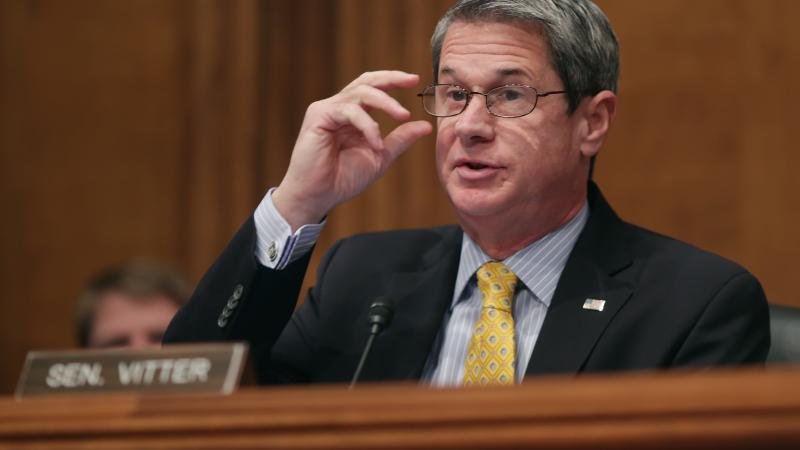As Biden's green energy agenda takes big hits, House Republicans announce legislation blitz
Rep. Steve Scalise said that House Republicans are bringing several bills to the House floor that will lower energy costs and push back on the Biden administration’s pause on LNG exports, among other things.
House Republicans this week are planning a barrage of legislation that takes direct aim at the Biden administration’s energy policies.
“Whether it's pumping gas at the gas station, or when you pay your household electricity bill, people know they're paying too much because of the far-left agenda here in Washington,” House Majority Leader Steve Scalise said in a press conference in West Virginia Friday.
Scalise said that House Republicans are bringing several bills to the House floor that will lower energy costs and push back on the Biden administration’s pause on LNG exports, among other things.
This blitz comes after President Biden has spent a few years rolling out his climate agenda across a wide range of legislation and new agency regulations. He vowed to “end fossil fuel” during his campaign, and since taking office, he’s taken dozens of actions toward that goal, as have Democrats in Congress. Last week, the Institute for Energy Research updated its list of “Ways the Biden administration and Democrats have made it harder to produce oil and gas.” The list had 125 items on it in November 2022, and it’s now grown to over 200.
Energy bills challenging Biden's "Green Agenda"
Among the bills the House will take up this week is H.R. 6009, “Restoring American Dominance Act,” sponsored by Rep. Lauren Boebert, R-Colo. The bill would stop the Bureau of Land Management from increasing royalty rates charged to companies drilling on public lands.
“Joe Biden and his rogue, unelected bureaucrats have made it crystal clear that they're willing to go to any lengths to dismantle our oil and gas industry, all in favor of pushing Green New Deal initiatives that cost taxpayers hundreds of billions of dollars,” Boebert said in a statement in December when the bill passed out of committee.
Another “energy week” bill is H.R. 1121, “Protecting American Energy Production Act,” sponsored by Rep. Jeff Duncan, R-S.C. The bill would block a moratorium on hydraulic fracturing, which is a drilling completion technology that breaks apart rocks deep in the earth to unleash pockets of oil and gas trapped in them. The bill specifically limits executive power and states that "the President may not declare a moratorium on the use of hydraulic fracturing unless such moratorium is authorized by an Act of Congress."
Another bill, H.R. 1023, sponsored by Rep. Gary Palmer, R-Ala., would repeal Section 134 of the Clean Air Act, which provides $27 billion to address what the EPA calls the “climate crisis” through the Greenhouse Gas Reduction Fund, created by the 2022 Inflation Reduction Act (IRA).
The House will also take up a bill to strike the Natural Gas Tax, which was also a part of the IRA. Rep. August Pfluger, R-Texas, introduced H.R. 1141 in January. “I am proud to stand up for the Permian Basin by introducing legislation to strike the President’s new harmful natural gas tax that will drive up the cost of household energy bills and make inflation even worse,” Pfluger said in a statement when the bill was introduced.
Several resolutions are also part of the “energy week” package. H. Res. 987, which is sponsored by Rep. Dan Newhouse, R-Wash., denounces the energy policies of the Biden administration as being “harmful” and “anti-American.” The resolution lists a number of actions the administration has taken against oil and gas production in the U.S. and instead “encourages the domestic production of reliable and affordable energy generation sources.”
The House will also consider H. Con. Res. 86, sponsored by Rep. Ryan Zinke, R-Mont. The resolution would declare a carbon tax as "detrimental to American families and businesses, and is not in the best interest of the United States." The Senate agreed to the resolution on Thursday.
Easing back
Scalise is betting on the success of the “energy week” blitz. During his press conference, he said that despite the slim majority Republicans hold in the House, they’ve been successful at passing bills, such as the bill to force TikTok to sever ties with the Chinese Communist Party.
How much of a dent in the green energy agenda the bills will make, should they all pass, remains to be seen. The Institute for Energy Research’s (IER) running list of 200 actions taken under the Biden administration against oil and gas shows a concerted effort to carry out Biden’s promise to end fossil fuels.
Yet, the U.S. remains the top producer of oil and gas, as it has for the past six years, and the industry remains profitable.
Kenny Stein, vice president for policy at the American Energy Alliance, a partner organization to the IER, told Just The News that there’s been a noticeable shift this year with policy proposals under the Biden administration coming in far less stringent as they approach the final versions.
For example, Stein pointed to the Environmental Protection Agency’s power plant emissions rule, which is expected to be finalized in April. The EPA said last month that it is excluding existing natural gas plants from its proposed emission reduction standards for power plants.
"The agency is taking a new, comprehensive approach to cover the entire fleet of natural gas-fired turbines, as well as cover more pollutants including climate, toxic and criteria air pollution,” EPA Administrator Michael Regan said in the February 29 statement.
The EPA may also make adjustments to its tailpipe emissions standards, which sought to force car manufacturers to have 66% of cars sold in the U.S. to be electric powered by 2032. The EPA is expected to slow the pace up until 2032 and increase it to meet later targets as laid out in the proposed rule. “It’s hard to call it an improvement, but they’re toning it down a bit,” Stein said.
Stein said part of it is that they’re facing legal challenges, and some have been successful. In June, the EPA abandoned a proposal to include electric vehicles in its renewable fuel standards over concerns it would generate lawsuits.
In 2022, the U.S. Supreme Court ruled against the Clean Power Plan, limiting the agency’s options for regulating greenhouse gas emissions. “They're seeing some of their rulemakings get slapped down, and they're trying to make them a little more defensible in court,” Stein said.
The Securities and Exchange Commission also toned down its climate disclosure rule when it passed the final version earlier this month. Even with the more stringent rules removed, the rule is facing an avalanche of lawsuits.
Pre-election restraint
The presidential election in November, Stein said, is also likely contributing to the hesitation on the part of the Biden administration to push things too hard. Should Biden hold the White House, the restraint will vanish after the election.
For now, the Biden administration is showing some hesitation on its green agenda, but the Republicans in the House this week are charging hard against it.
The Facts Inside Our Reporter's Notebook
Links
- Scalise said in a press conference
- vowed to âend fossil fuelâ during his campaign
- Ways the Biden administration and Democrats have made it harder to produce oil and gas
- list had 125 items on it in November 2022
- H.R. 6009
- Boebert said in a statement
- H.R. 1121
- drilling completion technology
- H.R. 1023
- provides $27 billion
- H.R. 1141
- Pfluger said in a statement
- H. Res. 987
- H. Con. Res. 86
- such as the bill to force TikTok
- past six years
- industry remains profitable
- said last month
- tailpipe emissions standards
- slow the pace up until 2032
- proposal to include electric vehicles in its renewable fuel standard
- ruled against the Clean Power Plan
- toned down its climate disclosure rule
- avalanche of lawsuits















